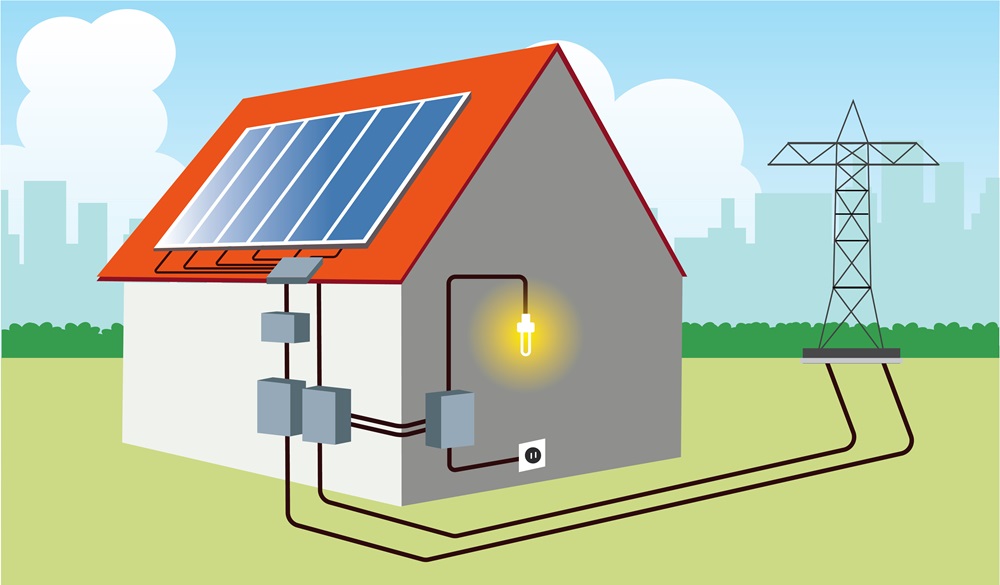Net metering is an electric utility billing mechanism that credits solar energy produced – in different ways – for the solar electricity produced. Both solar energy used in the home and solar electricity that is exported to the utility grid or your neighbor.
Net metering works this way. First the solar produced feeds the home – that solar energy just ‘slows’ down your meter and the utility doesn’t know or monitor that. However, if the solar produces more energy than the home is using a “net” flow of electricity goes back through the utility bi-directional meter and the utility nets that and you can see that on your bill.
Electric utilities in Central Oregon do ‘net metering’ differently.
Pacific Power carries any monthly extra solar and credits your next bill. This is called one for one. You get full retail rate off your bill for that solar electricity. However, Pacific Power will do this for one year, from March to March. If you still have a solar credit on your bill in March you will lose that and they are allowed to donate those kWh’s to non-profit organizations.
Central Electric Coop and Mid-State Electric Coop true you up on a monthly basis. If you have extra solar at the end of the month you get the current wholesale rate for that power and not a credit at a full retail rate. The wholesale rate is approximately one-half of the retail rate at approximately $.04 per kWh.
For those who have committed to a sustainable energy lifestyle by installing solar panels, net metering is a method for earning back the economic investment of their solar energy systems. It makes solar energy a two-way street, both in its ecological endeavors and economic rewards.
How Net Metering Works
When your solar panels overproduce electricity during daylight hours, the excess power is sent back to the grid, and your electric meter receives credits for the electricity your home did not consume.
Your utility company will then issue a bill that details the ‘net’ of what you used versus what you generated. If you consume more than you’ve generated, you’ll owe the ‘net’ difference, but any if you generated more than you consumed, that excess generation can carry over to future billing cycles depending on your electric utility.
Your bill will also include a summary of your solar credits. These credits are typically monetary and can vary based on the retail rate of electricity. Accrued solar electricity credits can offset future electricity bills, significantly reducing or even eliminating your electric payments.
The Benefits of Net Metering
Financial
Net metering can reduce the cost of your electricity bill, especially for rooftop solar system owners. This financial benefit is an incentive for homeowners to adopt solar energy, effectively turning the sun into a money-saving resource.
Environmental
For the broader community, net metering plays a crucial role in reducing reliance on non-renewable energy sources. By enabling individual participation in the grid, net metering enhances the overall stability and sustainability of the energy ecosystem.
Net Metering Policies
The federal government has historically supported net metering as a way to foster the growth of renewable energy. However, recent policy discussions suggest shifts in focus and funding that could impact future benefits for solar panel users.
Oregon has been a proponent of net metering, and local laws have been favorable toward solar energy users. Understanding and staying updated on Oregon’s net metering policies is important for local solar system owners.
You can learn more about Oregon’s net metering policy through the Public Utility Commission.
With changes in political leadership, public sentiment, and technological progress, it’s vital for solar owners to be vigilant in staying informed about policy updates that could affect their finances and energy strategies.
Maximizing Your Net Metering Benefits
Optimize Your Solar System
Regular maintenance and system optimization are key to reaping the full rewards of net metering. Ensuring that your solar panels are clean and functioning at their best reduces energy waste and maximizes your credit earnings.
Time Your Energy Use Wisely
Using appliances during peak solar hours can mean more of your energy needs being met by your system’s production, which in turn increases your credits and bill savings. Do you need to run the dishwasher or the washing machine? Do it during the day.
Consider Energy Storage
Incorporating energy storage solutions, such as batteries, can provide independence from the grid while optimizing the use of your solar energy and credits. This additional step strengthens your sustainability and improves your energy management.
The Future of Net Metering
As renewable energy systems become more prevalent, new models for net metering are emerging. Some states are exploring community-based net metering, which could open up different opportunities for involvement and benefits.
Despite its benefits, net metering faces challenges, including pushback from traditional utilities and evolving energy grid needs. Solving these challenges will be vital in ensuring that net metering remains a viable and rewarding avenue for solar system owners.
Participating in local energy policy discussions, staying informed about technological advancements, and continuing to advocate for renewable energy are crucial roles for solar system owners in shaping the future of net metering.
Net Metering in Central Oregon
For solar panel owners and those considering solar, understanding and making the most of net metering can increase the financial and environmental efforts benefits of your system. Sunlight Solar can install your solar system in Bend, Redmond, Sisters, Prineville, Terrebonne, and beyond. Request a free quote online or give us a call at (541) 322-1910.

